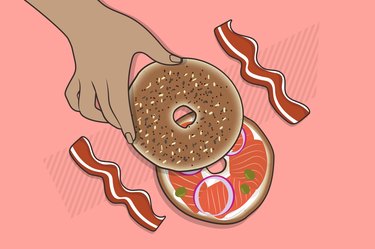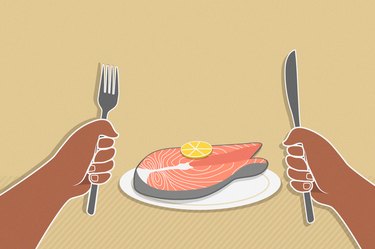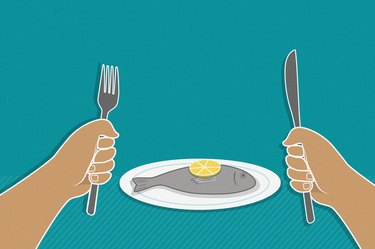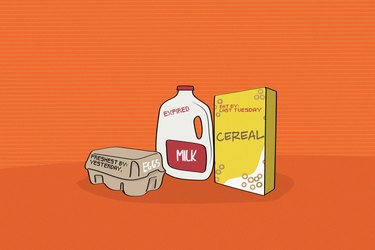
Grilling fish and meats lend a tender, mouthwatering flavor, and smoking them imparts hints of oak, hickory and mesquite, depending on the type of wood you choose.
While grilling and smoking meats don't require as much oil as frying, there's a concern that barbecuing under high temperatures can release chemicals called heterocyclic amines (HCAs) and polycyclic aromatic hydrocarbons (PAHs). HCAs and PAHs are mutagenic, which means they cause changes in DNA that are linked to an increased risk of cancer, according to the National Cancer Institute.
Video of the Day
Video of the Day
But the studies that have tied HCAs and PAHs to cancer are done on animals, and the doses of HCAs and PAHs in these studies are higher than the amounts humans would normally eat, says Bonnie Taub-Dix, RDN and author of Read It Before You Eat It — Taking You from Label to Table.
So is grilled or smoked food bad for you? Here's everything you need to know about HCAs and PAHs and how to reduce your risk while grilling or smoking fish and meats.
How Do HCAs and PAHs Form?
"When meats like beef, pork and poultry and fish are cooked at high temperatures — above 300 degrees F — HCAs and PAHs are formed. HCAs are created with any high heat cooking method, whether frying, grilling, pan-frying, barbecuing, cooking to well-done or over an open flame," say Tammy and Lyssie Lakatos, RDN, CDN, founders of the Nutrition Twins and authors of The Nutrition Twins' Veggie Cure.
The high heat causes the amino acids, sugars and components from animal muscle — creatine or creatinine, specifically — to react, forming the HCAs. The longer the meat is cooked at the high temperature, the more HCAs are formed, the Lakatos twins explain.
Meanwhile, PAHs form when the juices and fat from the meat drip into a flame or hot surface, creating smoke or more flames. The PAHs travel in the smoke or flame and stick to the surface of the meat. PAHs are also formed when meats are smoked or charred, the Lakatos twins say.
So how do they contribute to cancer risk? "There are specific enzymes in the body that metabolize HCAs and PAHs and then damage the body's cells and DNA," the Lakatos twins explain. "The activity of these enzymes appears to be related to cancer risk, and while two people may take in the same amount of PAHs and HCAs, their individual level of activity of these enzymes is different, which will affect cancer risk."
Related Reading
Is It Safer to Grill Certain Types of Fish and Meats?
Although there's always a risk for HCAs and PAHs when grilling muscle meats, especially fatty cuts, are more likely to create these chemicals, the Lakatos twins say.
Choosing leaner cuts of meat, poultry, fish, tofu, vegetables and veggie burgers can help reduce the amount of HCAs and PAHs. That's because vegetables are rich in antioxidants, which can help reduce the formation of HCAs and PAHs.
"Even though HCAs are created when grilling fish and seafood, you don't have to cook seafood as long as beef and chicken, which reduces the accumulation of HCAs," the Lakatos twins say. "The longer the meat is cooked and the higher the temperature, the more carcinogens are created."
Is Smoking Food Bad?
Because smoking fish and meats requires longer cooking times — like a couple of hours — the risk for PAHs and HCAs is greater. While smoking requires cooking fish and meat at a lower temperature over a long period of time, the smoke imparted on the food contains PAHs.
Research also shows that smoking meats can increase the risk of PAHs, depending on the type of wood chips and smoking spices you use. For instance, an August 2013 study in Food Chemistry found that using hickory wood chips led to a decrease in PAH contents compared to beech wood.
High intake of grilled, barbecued or smoked meat is also associated with an increased risk of mortality before and after a breast cancer diagnosis, according to a January 2017 study in the Journal of the National Cancer Institute.
Plus, the type of meats that are usually smoked tend to be fatty and processed, and eating these foods frequently is associated with an increased risk for chronic diseases, such as diabetes, heart disease and different cancers like breast, prostate, colorectal and pancreatic, according to a September 2016 review in the Journal of Internal Medicine.
How to Reduce HCAs and PAHs in Meat and Fish
You can reduce your risk of being exposed to HCAs and PAHs by following a few helpful strategies. Here are some cooking tips from the Lakatos twins and Taub-Dix:
- Use the "Flip-a-Minute" Rule: If you flip your burger every minute HCAs can be slashed by 75 to 90 percent because the surface temperature stays lower, the Lakatos twins say. This also helps prevent charring.
- Opt for Seafood: You reap the benefits of heart-healthy omega-3 fatty acids and will have fewer HCAs as long as you don't char it, the Lakatos twins say.
- Marinate Your Meat: Marinating is not only a great way to flavor your food, but it reduces the carcinogens, too. "Whether you dip your food in marinade right before grilling or soak it for hours, it lowers HCAs," the Lakatos twins say.
- Season With Spices and Herbs: Cooking your meat with herbs and spices reduces the formation of the carcinogens, thanks to their antioxidants, the Lakatos twins say.
- Grill on a Surface: Grilling meat, fish and poultry on a surface, like heavy-duty foil or a grill pan or pad can help prevent direct exposure to the hot metal surface of the grill, Taub-Dix says.
- Pre-Cook Thick Cuts of Proteins: Cook them in a microwave to help reduce cooking time and flame exposure on a grill, Taub-Dix says.
- Remove the Charred Pieces: Charred pieces of meat have higher amounts of PAHs and HCAs.
So, Is It That Bad to Eat Grilled or Smoked Food?
Cooking meat and fish under high temperatures, such as when grilling and smoking, may increase the formation of HCAs and PAHs, which are linked to cancer.
That said, you don't have to give up grilling and smoking altogether if you take some precautions.
"Lean meats and fish definitely have a place in a healthy diet. And although we don't typically recommend smoking meats due to the increased risk, grilling meat and fish at lower temperatures, not directly over the flame and/or in marinades are good ways to both keep animal proteins lower in calories and fat and to lower the creation of HCAs and PAHs," the Lakatos twins say.
You can also try baking, roasting, sauteing and poaching proteins instead to be on the safe side.
- National Cancer Institute: "Chemicals in Meat Cooked at High Temperatures and Cancer Risk"
- Food Chemistry: "Polycyclic Aromatic Hydrocarbons (PAH) and Phenolic Substances in Meat Products Smoked With Different Types of Wood and Smoking Spices"
- Journal of the National Cancer Institute: "Grilled, Barbecued, and Smoked Meat Intake and Survival Following Breast Cancer"
- Journal of Internal Medicine: "Potential Health Hazards of Eating Red Meat"
Was this article helpful?
150 Characters Max
0/150
Thank you for sharing!
Thank you for your feedback!



